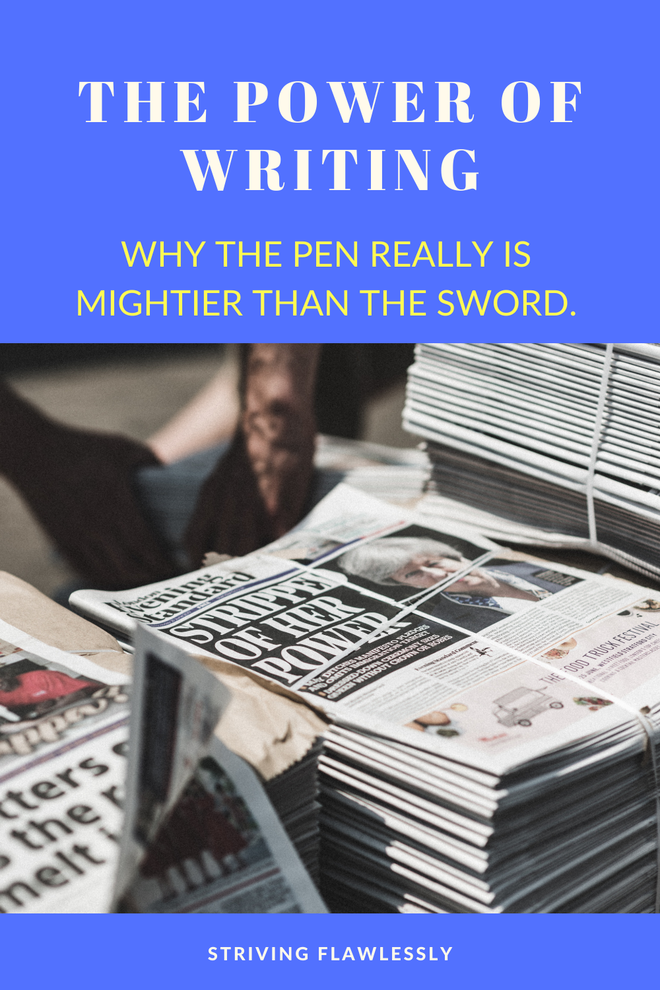|
by: Zaghra Savahl and Gina Klaff There's an old saying that goes “the Pen is mightier than the sword”. What does this mean? Is there any relevance to this saying today? There's an old saying that goes “the Pen is mightier than the sword”. What does this mean? Is there any relevance to this saying today? It is widely understood that this proverb relates to the power and influence of writing being more consequential than conflict or violence. With the devastating effects of the Coronavirus Pandemic, the destruction of wars and ongoing political tension and animosity, how do “mere words” have power over these realities? Communication Because of the pandemic, it’s difficult for many of us to speak to one another, especially for work. Many people have turned to emails and messaging apps to complete projects and share information. This is especially relevant in the working world because being able to write well is a skill that many employers still value, even if a position is not related to writing or editing. Employers want to make sure that the people working for them are going to properly represent their company, especially online. Social Media Initially created for the purpose of social networking, social media has become one of the most popular platforms to push political agendas. A Tweet or Facebook post of “mere words” has been the catalyst for social upheaval in many instances. Used for both good and bad, it is no doubt that words on social media have power over many realities. With close to half of the world's population using social media, it has become one of the primary ways to communicate. Movements such as Me Too and Black Lives Matter used social media in an effective way to fight for social justice against oppression, racism and crimes against humanity. Much of the BLM movement was organized through social media. Written stories about the deaths of George Floyd and Breonna Taylor were how many people first found out about the events that had unfolded. Their stories, along with many others, moved many people to mobilize and educate themselves about the systematic racism that exists in America. Writing about an issue that affects victims of crime and oppression on social media can give a voice to many who suffer in silence in their realities.
Because of the pandemic, much of the campaigning during the election was done virtually and voters were encouraged to vote by mail in order to stop the spread of COVID-19. Social media platforms such as Twitter, Instagram, and Facebook offered users with updates on the election, ballot counts, and Facebook even ran a commercial encouraging people to vote. On the flip side, words on social media can fuel perpetrators of crime and oppression and can serve as a tool for them to act on their behavior and beliefs. One example is the USA 2020 Presidential Election. The Former US President Donald Trump used social media as a platform to spread claims that the USA 2020 Presidential Election was a fraud and demanded that the election be overturned. Trump and many of his followers also used social media during the election to spread rumors that President Biden was unfit to run for office and rumors of election fraud. Trump also used Twitter to mobilize his supporters, and his tweets after he lost the election were one of the main influences of the violent riots against the 117th United States Congress that took place at the United States Capitol on 6 January 2021. After Trump was blocked from Twitter and other social media platforms after the attacks, he immediately began looking for a new platform where he could once again share his opinions. On the flip side, people also took to social media to help identify rioters and share their stories about how the riots impacted them. Again, words serve as a catalyst to influence a reality. Newspapers and Magazines – traditional and online Before the internet, print media was the primary source of distributing information to the public. Reporting on a variety of topics, the News was where we received our latest information on current affairs in the form of newspapers and magazines. While many newspapers and magazines have moved to an online space, it keeps its core purpose – informing the public on matters that have meaning to them. Writers that contribute to the news have influence. They shape the public`s thinking through the way they write on matters. When the Coronavirus Pandemic started spreading throughout the world, it was written words that informed the public and influenced the way in which we acted to protect ourselves. Words such as “wearing your mask,” “social distancing,” and “vaccines,” started becoming part of daily conversations. Written articles helped us understand the enormity of the situation and what we as citizens can do by making informed decisions. Educational Books Whether it be textbooks or literature, books have always been associated with education. Since childhood, reading from a book has been the foundation of education. From school years, to tertiary, to beyond, reading expands the imagination and subsequently your way of thinking. There have always been brilliant pieces of work published by authors who have inspired and educated their readers. Books and stories can also be a way for people to share their feelings, and we can walk in another person’s shoes when we read their story. Through reading the stories of others, we can better understand the people around us. Learning about the lives of others is something that can’t be accomplished through attacking people or bullying them. However, if a reader is meant to connect with the book, is there enough being done to ensure that readers of different cultures, ethnicities and religions are being catered to with stories that they can relate to? When Lee & Low Books posted the outcome of the Diversity Baseline Study 2019, which covered the entire industry i.e. executives, literary agents, sales, marketing/publicity departments, book reviewers and interns), the following was found: 76 percent White/Caucasian; 74 percent Cisgender Female; 81 percent Heterosexual; 89 percent non-disabled. Studies like these have brought exposure to challenges faced in the Literary and publishing industry and serves as an example of a point of reference for those who continuously challenge the status quo and fight for progress. Writers come from all walks of life. The above statistics raises questions on whether the public has access to written material and stories that not only cover multiculturalism, but also if writers from a diverse background are being given the opportunity to have their writings published and marketed sufficiently to a broader audience. Throughout history, there have been successful books by diverse authors with rich themes consisting of in-depth characters from various backgrounds. Examples include Angie Thomas: The Hate U Give, Khaled Hosseini: The Kite Runner, Jhumpa Lahiri: Interpreter of Maladies and Jacqueline Woodson: Brown Girl Dreaming, as per an article by the Clyde Fitch Report. While there has been progress made with the publishing and marketing of numerous books with diverse protagonists that are inclusive of multiculturalism, the statistics above show that there is still a long way to go. Scripted Entertainment - television and movies Even though the Entertainment Industry has always been seen as a means to purely entertain, it has been and still is, much more than that. Scripts written for film and television often have stories that deal with real-life issues. The written script is what gives birth to what is seen on screen. A team of writers has the power to develop a story that can influence reality. An example of this is the representation of characters. If one thinks about the way Muslim characters were written and represented before, during and after the 9/11 Attacks, we can question how much these characters had influence on the way the audience perceived Muslims and Islam. That is the power the pen holds. One piece of writing can make a difference. Regardless of whether it has a positive or negative impact, writing and reading a piece promotes critical thinking. It allows us to assess a reality and develop different perspectives thereof. It gives the opportunity for us to engage with others, to understand one another. As long as you have an opinion on a matter, writing about it can open a whole new world about something you thought you might not have had any influence over.
0 Comments
Leave a Reply. |
Archives
April 2023
Categories
All
|
WORLDWIDE SHIPPING IS HERE


 RSS Feed
RSS Feed